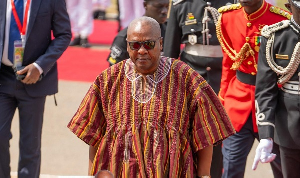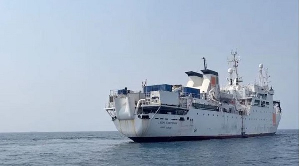The House has allowed other members from both sides of the political divide to speak for or against the 2020 financial policy statement presented by the government, and last Tuesday was for the leaders.
For two hours, the Majority Leader, Osei Kyei-Mensah-Bonsu, and his colleague leader of the Minority, Haruna Iddrisu, gave reasons for the economy performing better or otherwise.
Procedurally, the Majority Leader, mostly, if not all the time, has the final say, same of which was experienced last Tuesday, as Haruna Iddrisu took his turn before Osei Kyei-Mensah Bonsu.
The Member of Parliament (MP) for Tamale South opened his debate with a mockery of the budget document. Following some discrepancies, the Finance Minister, Ken Ofori-Atta, had to amend the policy statement, and subsequently, printed the final document out for the MPs.
“Mr Speaker, let me thank you for the opportunity to contribute to the motion that this House approves the financial policy of government for the year ending 31 December 2020, which was moved on Wednesday, 13th November 2019, by the Hon Minister for Finance, Mr Ken Ofori-Atta, which he subsequently amended on Friday, 15th November, 2019.
“Mr Speaker, as I speak, I have three different versions of the budget. There’s a King James Version, there’s another version, and there’s a new version. It is important that this House knows what we are debating, particularly, when the Minister for Finance, in his own words, referred to a paragraph 9, the miracle of the two fishes. Only he sees the miracle. The rest of Ghana ought to see and ought to know and appreciate in the miracle that he talked about,” he stated.
Citing page 233, he criticised a GH¢6 million allocation for government communication, stating that it was the hope of the opposition that those moneys did not “go to NPP serial callers or communicators.” He explained further that naturally, that money should be allocated for a call centre of a ministry.
Whilst on the same page, he criticised an allocation of GH¢150 million for the government’s One District, One Factory policy. He said that the promise and fail attitude of the government must change, explaining that it stated the policy was for the private sector-led initiatives, so why then put in the taxpayer’s money.
Touching on the financial sector, Haruna Iddrisu referred to an aspect of the budget that spoke of the government’s intervention in the banking sector. He recalled that the Finance Minister had appeared before the House and promised justice for depositors. But for Haruna, the best justice is for government to pay depositors their moneys.
He further announced, following the government’s intention to open a new national bank, as stated in the budget, that his side will not support any initiative by the government to set up a new national bank.
According to him, if the government had any support, it should rather give same to the existing National Investment Bank and Agriculture Development Bank, especially when it would have to raise some GH¢400 million as capital, asking, “where are you going to get that money from?”
Referring to page 201 of the budget, he debunked the Minister’s claim on the total employments made. He described the 350,000-recruitment figure quoted by the Minister as “misleading,” adding that “where are they?”
He further called on the government to appreciate the enormous wisdom of President Mahama on debt service and debt management, citing Terminal 3 Kotoka International Airport, that it was not sitting in the debt of the country.
Concluding, he stated that if the whole accumulation was done on total debt of the country, the Minority did not think it be within the fiscal responsibility Act threshold of 5%. On capping, which he told the Finance Minister was not a means of saving, though it gives additional money to spend, should be expended on related priorities.
He touched on agriculture – that the country had still not been able to meet the expected 10% investment in that sector, citing the Maputo Protocol. He raised issues with the cost of the free Senior High School on the public purse, as education drained more funds than health.
He said: “Mr Speaker, we in the Minority are not convinced about his reportage on the fiscal deficit for 2020, because it still excludes some critical expenditure that he himself is not reporting on…We will not accommodate misreporting in order to look good.”
Taking his turn, the leader of the House, who is the MP for Suame, Osei Kyei-Mensah-Bonsu, he first responded to a few of the issues his colleague had raised in his submission, with regards to the legacy of Mr Mahama. Citing the Terminal 3, mentioned by the Minority Leader, he said that a financial audit had established the project should not have cost the nation more than $175 million, “and yet, it cost this country $400 million. That’s the legacy you left us.”
Giving some observations made from the debate, he said some members set their own questions, had their own marking scheme, which, at the end of the day, saw them digressing from the important issues, and others did not speak to facts and figures.
He stated that the country had grown from strength to strength under the administration of President Nana Addo Dankwa Akufo-Addo, stating that figures do not lie.
He quoted the various economic growths from 2001 through to 2009, which saw a re-basement of 9.1%, compared to the following eight years of the National Democratic Congress (NDC), and what is being witnessed under this government, to make his point of a steady growth. He said that from the 9.1% growth rate recorded in 2008, the GDP reduced to 4.8% in 2009, then to 7.9% in 2010, and 14% in 2011. The first time petroleum money was factored in the country’s reserves, he added. In 2012, he said the growth was 9.3%, 7.3%, in 2013, 2.9%, in 2014, 2.2%, in 2015, describing it as “the worst GDP growth rate for 36 years in this country.” He continued that in 2016, the growth was 3.6%, the worst in 22 years, he opined.
“Mr Speaker, these appalling and distressing growth rates under the Mahama-led government included oil revenues. It is on this walking-dead performance that you want to come back?” he asked the Minority.
“Mr Speaker, the people of this country are cleared-eyed enough, and certainly, they will choose a David over a Saul to rule this country,” Osei Kyei-Mensah-Bonsu remarked.
The Majority Leader took his time to debate on all the sectors of the economy as far as the 2020 Budget statement was concerned.
The Minority Leader, in his argument, questioned the investment in the free SHS, but the Majority Leader had a contrary view to that, indicating that it was an investment in human capital.
He mentioned that many teaching and non-teaching staff had been employed, the Nation Builders Corps, as well as the Forestry Commission, he added, have all employed people.
Touching on the gains made in the energy sector, resulting in the increasing in power generation, he said that “the dum-so days are certainly over.”
He disagreed with the Minority Leader that the New Patriotic Party (NPP) had a litany of broken promises, as he referred the House to some failed promises of the previous NDC.
Meanwhile, the Finance Minister, who wrapped up the entire debate, reiterated that, indeed, 2020 would be a year of roads, describing as “unprecedented,” investments in the road sector by this government.
Acknowledging comments on the proposed $3 billion international bond issuance in 2020, the Finance Minister, who did not appear in his usual all white apparel, re-stated the resolve of government to spend $1 billion on public liability management of the current public debt portfolio, and the remaining to $2 billion committed to budget execution.
On the financial sector bailout, he said: “Whilst others were indifferent and negligent, we did demonstrate compassion and decisiveness,” he said, and added that the bailout was instrumental.
After him, the Speaker, Prof Aaron Michael Oquaye, put the question for the House to approve the budget, to which the response was positive.
The various committees would then delve into the actual estimates, where sector officials would meet the committees to defend their allocations.

















